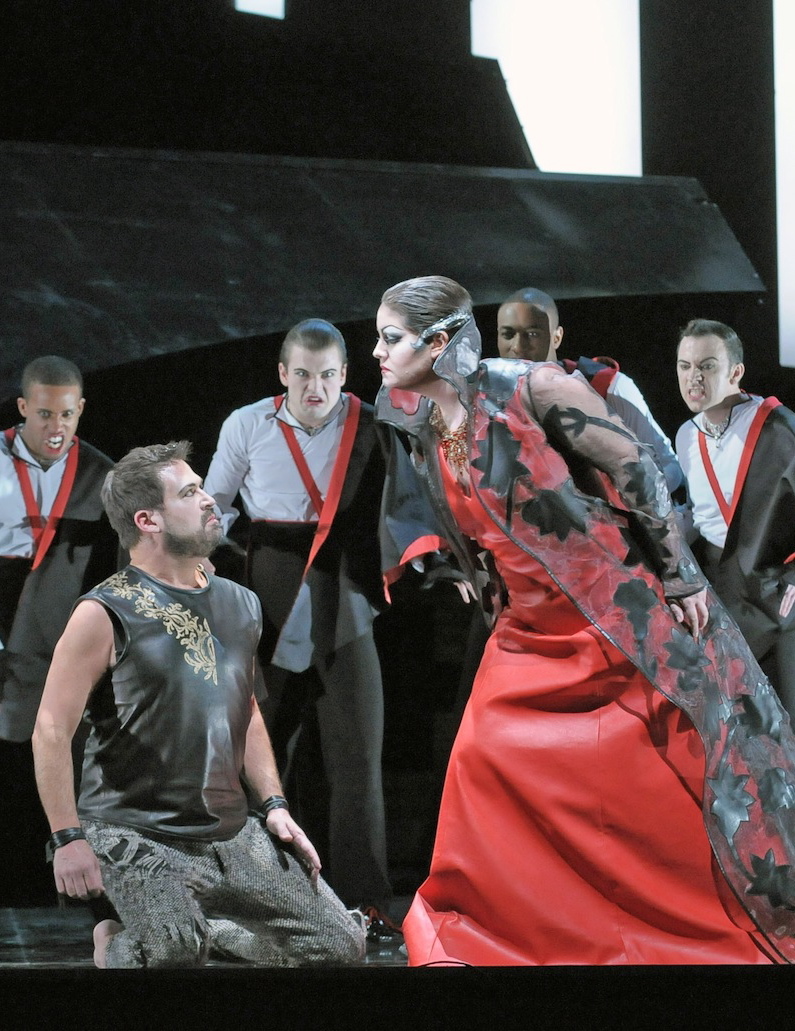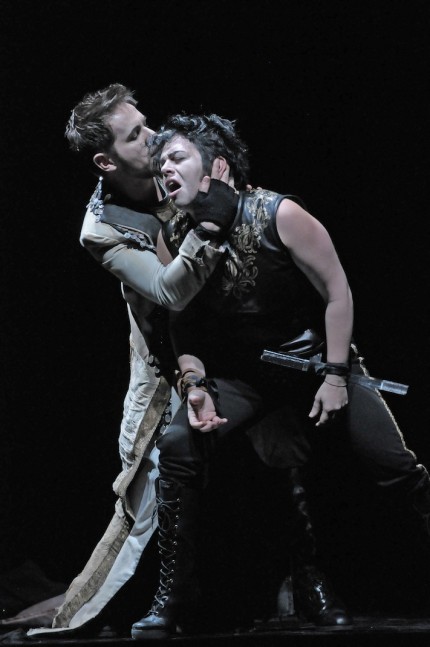Stellar vocalism and goofy charm make for an engaging “Rinaldo” at Lyric Opera

The Lyric Opera of Chicago is closing its season with Rinaldo, the opera that made Handel’s name in England and served to launch his long and extraordinary career.
Premiered in 1711, Rinaldo was the first Italian opera Handel composed in London. Packed with visual spectacle and stage effects, Rinaldo proved an instant and lasting hit, revived often throughout the composer’s life and helping to pave the way for Handel’s future stage successes.
As with most Handel operas, the storyline has aged less well than the music. The narrative concerns the title soldier who leads a group of Christian warriors laying claim to Jerusalem. Rinaldo’s beloved Almirena is abducted by the enemy sorceress Armida, the consort of the blood-thirsty Jerusalem king Argante. Complications ensue when Argante falls in love with the captive Almirena and Armida with Rinaldo, but the crusaders win the battle, the villains are converted and all ends happily.
If the creaky scenario and plank-like pageantry have dated badly, Handel’s remarkable music for Rinaldo has endured—a rich, majestic score with one knockout aria after another for nearly four hours, including some of the most indelible vocal music of his long career.
This is Lyric’s first staging of Rinaldo and it is a timely one in the opera’s 300th anniversary season (the company had previously presented a concert performance with Marilyn Horne in 1984). And while this new production didn’t quite catch fire until Act 2, with David Daniels leading a largely terrific cast, this supremely well sung Rinaldo made up for the show’s occasional lapses.
Lyric has turned to director Francisco Negrin, who helmed the company’s 2003 Partenope, for this assignment. And while there were some characteristic moments of excess and silliness from this flamboyant director—brace yourself for his revisionist Werther next season—in general this was a visually striking and imaginative postmodern retooling with more hits then misses.
Louis Desire’s unit set is an imposing, sloping wall of luminous glowing red columns, with a jumbled tower of letters spelling “Gerusalemme” center stage. There is also a large Gatsby-like eyeball, yet the coup’ d’theatre is a massive harpsichord body that descends from the heavens and serves as multi-use prop and retaining cell for the captured Almirena. When Armida works her spell to entice Rinaldo’s beloved, the top of the harpsichord opens to release several multicolored helium balloons.
For all its postmodern kitsch, the Lyric’s new production has a certain sardonic goofy charm that eventually wins you over. The staging only occasionally got in the way of the singing, and overall proved a lot less pretentious than Peter Sellars’ much-hyped retooling of Handel’s Hercules as Gulf War psychodrama a year ago.
As the lone star in the cast of six principals, David Daniels did not disappoint, bringing a refined tone and depth of feeling to the opera’s hero. The celebrated countertenor’s rendering of Caro sposa sounded a bit offhand opening night with a less-than-seamless legato yet the closing section brought the right degree of inward tenderness. Daniels blazed through the coloratura roulades of his many virtuosic arias with impressive facility and even articulation, even at breakneck tempos.
The other five principals are all making their Lyric Opera debuts.
Julia Kleiter as Almirena doesn’t get that much to do in this production—apart from being imprisoned in the giant harpsichord and tied up with the instrument’s strings. Yet the German soprano, in her first Handel role, earned the most enthusiastic ovation of the evening with an affecting, delicately shaded Lascia ch’io pianga mia cruda sorte, one of Handel’s most ineffably beautiful arias.
Elza van den Heever and Luca Pisaroni proved an engaging pair of emotionally volatile heathen villains in their love-hate-love relationship.
As the sorceress Armida who captures Almirena, van den Heever made an outstanding local debut. The South African singer possesses a gleaming, powerful soprano as well as daunting agility. Van den Heever stole the show with her vampish diva turn in the showpiece aria Vo’ far guerra. Clad in red leather, she vows violent revenge on Rinaldo for rejecting her, playing the giant harpsichord, taking a bottle to swig out of the instrument’s drawer, and turning the aria into a battle for dominance with Jory Vinikour’s (terrific) performance of the virtuosic obbligato harpsichord solos, in an irresistible star turn.
Luca Pisaroni as Argante likewise was an inspired heavy, making a fiery and imposing entrance with Sibillar gli angui d’Aletto. The Italian bass-baritone has an ample yet elegant voice, and impressive flexibility, able to get around the corners of the virtuosic runs.

In the role of Eustazio, Iestyn Davies also made a quietly sensational company debut. The English countertenor contributed some of the most consistent vocalism of the evening as the priest/advisor, showing a rich-bodied, evenly produced voice. Davies handled his bravura arias with unflagging accuracy and ease, and led off Act 2 with a rapt, glowingly sung Siam prossimi al porto.
As Goffredo, Sonia Prina proved an apt gender-bending commander in this trousers role with her leather pants, spiky hair and hearty stage presence. Vocally Prima was more of a mixed bag. Her opening aria (Sovra balze) was a shambles Wednesday night, and while the Italian contralto sang with greater security and flexibility as the evening unfolded, accurate intonation remained a sometime thing.
Kiri Deonarine, Cecilia Hall and Jennifer Jakob as the Three Women, Ryan Belongie as the Sage and James Kryshak as the Herald effectively rounded out the cast.
Negrin’s direction of the principals in this difficult assignment was mostly fluent and sensitively handled with the serious moments allowed to have their impact. Having Armida’s Furies depicted as omnipresent male dancers was less inspired, with the boys’ high-stepping moves in Act 2 pushing the camp button just a bit too hard.
The opening-night performance sounded like it could have used more orchestra rehearsal with fitful disarray between singers and ensemble throughout the first act. Thing settled down after intermission and Harry Bicket showed once again why he is one of our finest Baroque opera conductors, leading a performance that was incisive and spirited while giving the big set pieces ample room to breathe.
The reduced Lyric Opera forces proved a crack Baroque team under Bicket’s idiomatic direction, and Vinikour’s dazzling harpsichord playing led the instrumental obbligato moments including the honeyed oboe solos of Judith Kulb and Lisette Kielson’s on-stage sopranino recorder solo.
Rinaldo runs through March 24. lyricopera.org; 312-332-2244.
Posted in Performances



Posted Mar 04, 2012 at 7:34 pm by umRoland Buck
The costumes in the picture above sure carry the smell of Eurotrash.
“For all its postmodern kitsch,”
I plan to see this opera, but I hope that the director has not completely ruined it.
While Baroque operas do not have to be perectly authenic reproductions, they should remain close to what was done when they were first performed.